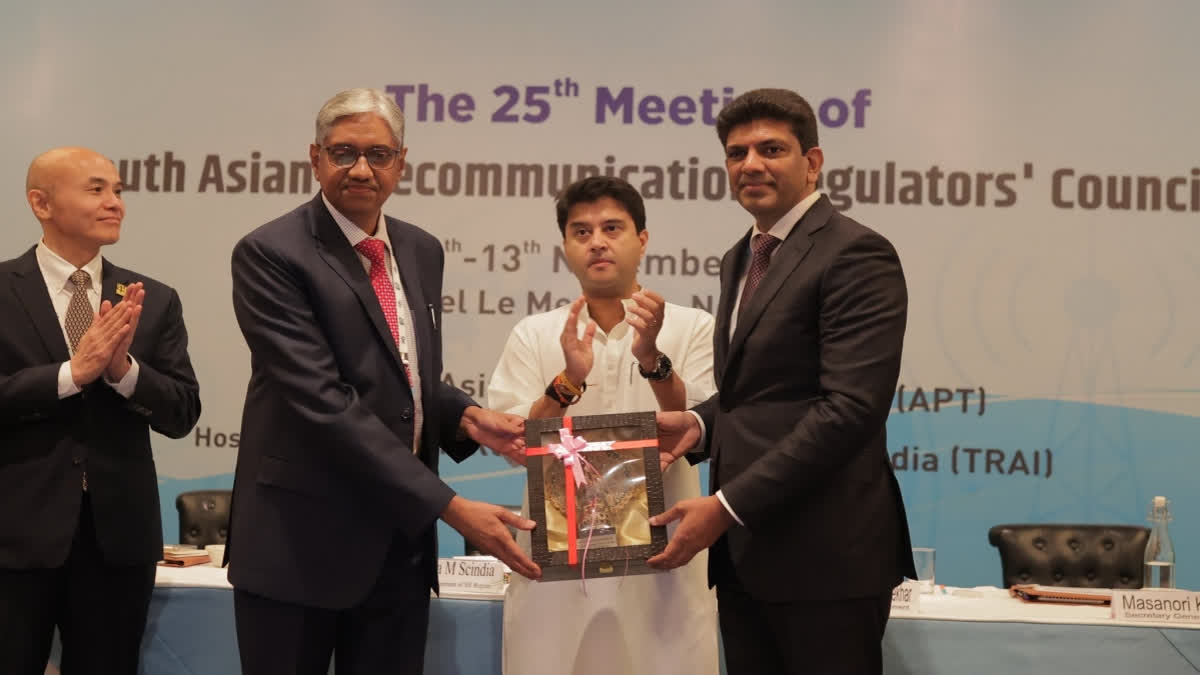New Delhi: The Telecom Regulatory Authority of India (TRAI) has launched a three-day event here, bringing together telecommunication regulators from across South Asia to discuss collaborative strategies and regulatory frameworks to advance digital connectivity in the region.
In an exclusive interview with ETV Bharat, TRAI Chairman, Anil Kumar Lahoti, who has been unanimously elected as the Chairman of the South Asian Telecommunication Regulators' Council (SATRC) highlighted the importance of the SATRC, describing it as a "sub-regional forum where telecommunication regulators of South Asia come together to discuss issues related to the development and expansion of telecommunication and ICT."
Lahoti explained that the SATRC aims to foster shared learning, allowing each nation to share its unique challenges and regulatory experiences while exploring actionable steps to enhance digital infrastructure.
“The South Asia region is home to more than a quarter of the world’s population,” Lahoti remarked. “Whatever developments occur here in digital connectivity will have a ripple effect globally.” He emphasised that the region’s varied demographics and socio-economic conditions call for tailored telecommunication policies to bridge digital divides and promote digital inclusion.
The Chairman also touched on universal issues like spam and product calls, which persist globally, noting, “These issues will also be part of our discussions as we work to identify practical solutions for telecom expansion in the region.”
Additionally, Lahoti reaffirmed TRAI’s commitment to affordable communication services, stating, “Our data cost per GB is approximately ₹9, one of the lowest in the world.” He warned consumers to stay alert to fraudulent calls impersonating TRAI, urging them to report such incidents via the Department of Telecommunication’s Chakshu portal.
Minister Scindia Emphasizes India’s Role as “Voice of the Global South”
The event was inaugurated by Minister for Communications, Jyotiraditya Scindia, who highlighted India’s role as a leader in digital infrastructure and its growing influence as the “Voice of the Global South.” In his keynote address, Scindia remarked that SATRC-25 would be an “excellent platform for knowledge-sharing” and would provide a confluence of perspectives on emerging regulatory challenges.
Towards a Safe, Secure and Standard driven Future!
— Jyotiraditya M. Scindia (@JM_Scindia) November 11, 2024
Today, had the opportunity to inaugurate the 25th South Asian Telecommunication Regulators’ Council (SATRC) Meeting.
As India emerges as the Voice of the Global South, #SATRC25 will serve as a crucial platform to bring 9… pic.twitter.com/JfLnVTDliz
Scindia underscored the transformative impact of India’s digital infrastructure, noting that the country boasts over 1.2 billion telephone connections and 970 million internet users, with the digital economy accounting for 10% of the national economy—a significant rise from 3.5% just a decade ago. India’s digital economy, he added, is growing nearly three times faster than the national economy, and he expects it will comprise 20% of the economy by 2026-27.
"South Asia must unite in its efforts to build a connected, resilient, and sustainable future," Scindia said. He urged SATRC members to address shared goals, including digital inclusivity, sustainable networks, and consumer protection, to create a "secure, safe, and standard-driven future" in the region.
Sh @JM_Scindia Ji's address at the inauguration of the 25th Meeting of the South Asian Telecommunication Regulators Council
— Office Of JM Scindia (@Officejmscindia) November 11, 2024
https://t.co/LYGh1kvokZ
Non-Terrestrial Networks and Regional Cooperation
Scindia highlighted recent technological advancements, particularly the potential of Non-Terrestrial Networks (NTNs), which provide satellite-based connectivity to reach remote and underserved areas. He expressed optimism that NTNs could "unlock new vistas in communication technologies," enabling applications across diverse sectors and supporting the United Nations Sustainable Development Goals.
Chandra Sekhar Pemmasani, Minister of State for Communications and Rural Development, echoed Scindia’s sentiments, emphasising telecommunications’ role in empowering communities. He called for regulatory approaches that encourage innovation while ensuring consumer protection.
APT’s Vision and India’s Role in Digital Connectivity
The opening session also featured remarks from Masanori Kondo, APT’s Secretary General, who reiterated the APT’s mission to create an inclusive digital ecosystem across Asia. He called for harmonised regional policies to streamline communications and accelerate economic growth through digital connectivity.
Welcoming the gathering on behalf of TRAI, Lahoti highlighted India’s role in fostering cross-border partnerships to ensure digital equity and bridge divides within the region. Major General (Retd.) Mohammad Emdad Ul Bari, Chairman of Bangladesh’s Telecommunication Regulatory Commission and Chair of SATRC, reflected on SATRC’s progress over the past two decades and stressed the need for continued cooperation to harness digital transformation for the benefit of South Asian citizens.
Focus Areas for SATRC-25
The SATRC-25 event, spanning November 11-13, 2024, provides a platform for member nations to discuss a wide array of regulatory and technological topics. The primary areas of focus include radio frequency coordination, strategies for telecommunication development, emerging regulatory trends, and international telecommunication affairs. The event also brings together industry representatives, experts, and service providers, enabling cross-sectoral engagement and the exchange of best practices.
In his closing remarks, Scindia reiterated that South Asia’s role in global ICT development is essential. He stressed that the region’s regulatory frameworks should foster innovation while supporting inclusivity, driving the shared vision of a digitally connected and resilient South Asia.
Organised under the auspices of the Asia-Pacific Telecommunity (APT), the 25th South Asian Telecommunication Regulators’ Council (SATRC) gathering includes notable participation from countries like Afghanistan, Bangladesh, Bhutan, India, Iran, Maldives, Nepal, Pakistan, and Sri Lanka. This year’s event also features a delegation from Taliban-controlled Afghanistan.
The SATRC-25 represents a crucial opportunity for South Asian nations to collaborate on digital development.



